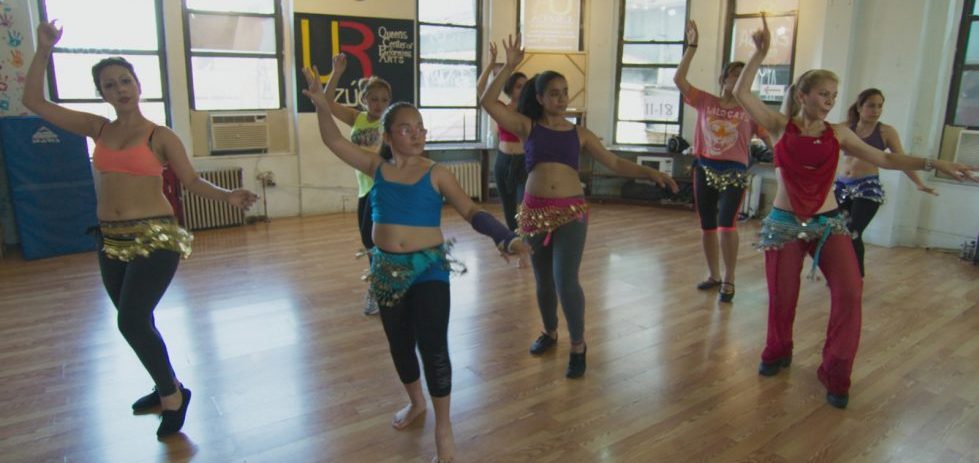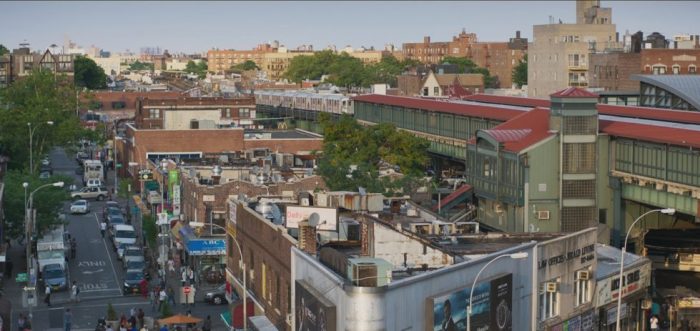
Frederick Wiseman is anything but objective. His films are often ascribed with that label, but that sits somewhere between a common misconception and an egregious error of judgement—and perhaps a great compliment to the skill with which he hides his manipulation. Take, for example, his latest documentary, the 190-minute In Jackson Heights, which charters the somewhat amorphous northern borough of the title located in Queens, New York. It’s a dense and vibrant hub of multiculturalism, and with 167 languages spoken within its boundaries, confidently spoken of as “the most diverse community in the whole world”. Wiseman flits quietly and gracefully in and out of shops and eateries and barbers, between quiet street encounters and parades, into clandestine community meetings, through the offices of legislators, and out into parades and public rallies. Somehow, though we never see him or hear his voice, we can sense the agility and immense satisfaction with which his film was shot. He chooses not to commentate on, narrate or adorn these images with voiceovers or interviews, and he chooses, from ten months of editing and 120 hours of rushes, which footage to include in the film’s final cut. The accumulation of these choices is a film which is intended to communicate Wiseman’s personal impression of the place and the experience of recording it. To label such a process “objective” or “impartial” or merely “observant” would be of great discredit to his art, one of decisive judgements of selection and arrangement that result in the arresting, voyeuristic poetry of his documentaries. Frederick Wiseman’s perceived lack of dramatic effect is a dramatic effect of its own, and it’s that long-held conviction to principles of austerity that has carved his discreet place amongst the pantheon of our greatest living filmmakers.
Wiseman, so the now-familiar saying goes, is America’s foremost chronicler of public and cultural institutions—mostly in the USA, often in New York City, and, in isolated cases, abroad (Crazy Horse, Le Danse and Comedie de Francais were made in France, National Gallery in Britain). Hospitals, public schools, welfare offices and cabarets—institutions are his forte. He takes a place, delineates its boundaries and lays out its parts for all to see. In Jackson Heights is the third of his films (after Aspen and Belfast, Maine) to confuse the very idea of the institution by expanding its definition—it is concerned with neighbourhood and community and the melting pot of people that vivify such clinical nouns, and rather than specifically arguing for Jackson Heights’ status as an institution on its own (like, for example, Central Park), it celebrates the concept of community as an institution in its broader meaning. In Jackson Heights is as much a treatise on the democratic process as his almost four-hour 2006 film Public Legislature, which takes place entirely inside the Idaho State building, and in which we see the multiple laws flow through the formal lawmaking process from conception to binding actuality. That film draws heavy focus to the fact that in states miles from Washington, ordinary, working people compose the rule of the land. In Jackson Heights takes that idea further by stepping outside of legislators’ drab, off-white corridors and into the community, reminding us that at a fundamental level, democracy is comprised of people—passionate and concerned and often maltreated—toiling together to devise its framework before the paperwork makes it real.

Once you get the hang of it (and for newcomers it can take an hour or so), you learn to give yourself over to Wiseman’s loose, unregulated groove. He’ll linger briefly outside of a building, surveying its signage and letting its window dressing hint at the contents within, and then he’ll take you inside. These episodes can last anywhere from a few brief minutes to a quarter of an hour or more, and while there’s a beat-like predictability at play in his film’s rhythm—in and out, in and out—the same can’t be said of its extraordinary contents, which flow freely and often unexpectedly. We’re privy to moments of intense privacy: a 94-year-old woman speaking about her loneliness, and being asked of her secrets to aging gracefully. We’re shown birthday parties and prayer groups of all denominations, schools for belly dancers, muslim children and cab drivers, live poultry being slaughtered in the Halal method, a Hare Krishna ceremony, and Hindu deities on display. These are colourful micro details in a larger patchwork aglow with stories of self-motivated activism amongst Jackson Height’s blighted minorities, which are the film’s backbone and conviction: gay seniors talk assembly strategy in a local synagogue, a travel agent fights despairingly against impending corporate takeover, petitioners rally voices against gentrification, and trans people share experiences of violence and harassment. At meetings of the ‘Make the Road’ group for imperiled latinos without citizenship, a woman tells her daughter’s ghastly border-crossing tale. Wiseman isn’t mournful, nor content to complain or deplore. His subjects speak eloquently for themselves, and he acts not as a quiet observer but as a vibrant loudspeaker for their concerns.
For all the import that these indoor gatherings have on Wiseman’s theme of grassroots community organising, it’s hard to imagine the film at all without its scenes of street life in its messy, colourful variety. Vast establishing shots show us Roosevelt Ave from above, its iconic above-ground subway line craning over the neighbourhood’s main strip, itself littered with food carts, small businesses, canine clothing stores and hair braiders that bear punchy, idiosyncratic names like ‘Michelle’s by Renee’. Every now and then the infrastructure rattles as a train passes through. Closer to the ground there is a flurry of spirited, life-affirming activity, including three scenes of random and remarkable beauty which are unpredictably moving. The first is but a fugitive moment, barely there: a florist’s street cart captured in a sequence of close-ups, with the radio blaring, of all things, Jason Derulo’s 2013 hit ‘Talk Dirty’ overtop. The song’s underlying Latin swing and the smacking, overwhelming colour of sundry flowers clashing is a perfect storm, and it’s matched by Wiseman’s cheeky, youthful editing, poetry in motion. The second observes the Colombian community gathered in a hall, watching a preliminary match against Greece in the 2014 World Cup. They win three-nil. Wiseman collapses the entire game and the celebrations that follow into a short sequence, cutting out speech and using the sound of horns and cheers to tell an isolated short story within his expansive epic. Celebrations take to the streets, and before long police have interfered. Tears of joy turn sour and bloodied noses rain on their parade and it dissipates under foreboding violence. The seamless flow of sounds and images that compose this micro-tale ends in a smattering of lone horns trailing home to private celebrations as the next sequence begins. The third is the film’s final, heart-bursting shot, simply too good to spoil.
Wiseman insists that the omnipresence of his camera and small crew of three (he records sound alongside cinematographer John Davey and an assistant) doesn’t modify the behaviour of his subjects, but his style, seemingly imperceptible, is one that so many documentarians attempt but so few are able to actually procure. He catches his subjects in a state of droopy relaxation, unmade for camera and not performative in the slightest. They’re open and unselfconscious, merely behaving. Add to this already delicate concoction Wiseman’s reticence to impose narrative structure on this freewheeling docu-poem and you have a film liberated from the constraints of central conflict and personality exhibitionism that have become so modish in documentary filmmaking of late. This effortless, extempore ode to a city unravels with head-spinning spontaneity and without a sniff of worship. Early in the film a litter-clearing religious charity group are interrupted by a woman en route to visit her dying father, asking them for a prayer. And so there we are, hands linked, fervently praying (evangelising, even) for a stranger named Thomas who is dying of cancer. Most would chuck that footage out. For Wiseman, it’s the good stuff. With In Jackson Heights, there’s really no knowing what he’ll throw you into (or at you) next, but the sheer diversity of experiences he offers—a motile, kinetic tapestry of exuberance and colour—is, simply, a breathtaking joy to behold.
Around the Staff
| Jessica Ellicott | |
| Luke Goodsell | |
| Ian Barr | |
| Conor Bateman |
